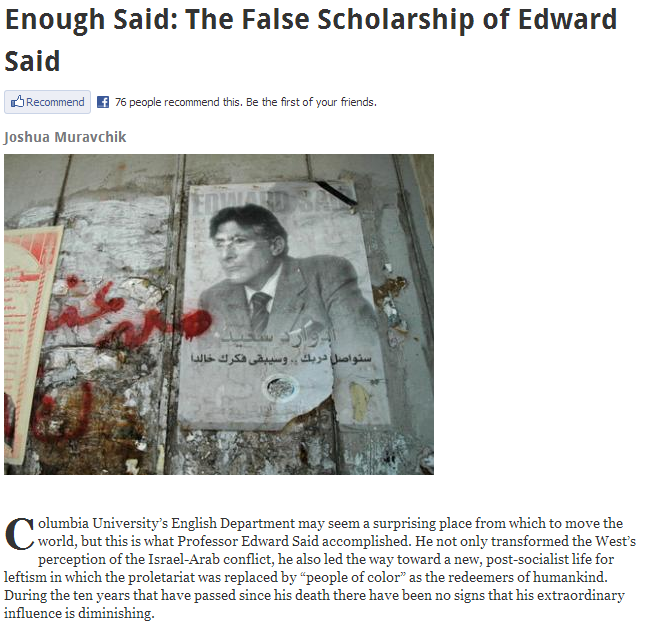An icon of the Left dethroned.
The grand daddy of pseudo scholars tossed onto that ash heap of skewed historical revisionism. He managed to spawn millions of anti-Semites before he finally died.
[…] Initial reviews of the book, often by specialists, were mixed, but it appeared at a time when “multiculturalism” was becoming the new dogma of the intellectual elites and took on a life of its own, eventually being translated into more than three dozen languages and becoming one of the most influential and widely assigned texts of the latter part of the twentieth century.
Critics pointed out a variety of errors in Orientalism, starting with bloopers that suggested Said’s grasp of Middle Eastern history was shaky. Said claimed that “Britain and France dominated the Eastern Mediterranean from about the end of the seventeenth century on,” whereas for another hundred years it was the Ottomans who ruled that area. He had written that the Muslim conquest of Turkey preceded that of North Africa, but in reality it followed by about four hundred years. And he had referred to British “colonial administrators” of Pakistan whereas Pakistan was formed in the wake of decolonization.
More serious still was his lack of scruple in the use of sources. Anthropologist Daniel Martin Varisco, who actually agreed with Said on many ideological issues, observed in his book Reading Orientalismthat “one of Said’s rhetorical means for a polemical end is to partially . . . quote a phrase while judiciously neglecting words that would qualify and at times refute what the phrase alone might imply.” He offered as an example of this duplicitous method Said’s use of two quotes from the writings of Sania Hamady, an Arab-American who wrote critically of Arabs. The quotes put her in a bad light, but both times, says Varisco, they were taken from passages where Hamady is merely summarizing someone else’s view, not giving her own. In the same vein, John Rodenbeck, a professor of comparative literature at the American University of Cairo, found that Said’s “persistent misconstruction and misquotation of [the nineteenth century Orientalist Edward] Lane’s words are so clearly willful that they suggest . . . bad faith.”
Said’s misleading use of quotes shows the problem with his work in microcosm. On a broad view, Said fundamentally misrepresented his subject. In challenging Said’s first alleged “dogma” of Orientalism, which ascribes all virtue to the West and its opposite to the Orient, Varisco says that Said is describing “a stereotype that at the time of his writing would have been similarly rejected by the vast majority of those [Said] lumps together as Orientalists.” And the British writer Robert Irwin, whose bookDangerous Knowledge offers a thorough history of Orientalism and also a rebuttal of Said, notes that, historically, “there has been a marked tendency for Orientalists to be anti-imperialists, as their enthusiasm for Arab or Persian or Turkish culture often went hand in hand with a dislike of seeing those people defeated and dominated by the Italians, Russians, British, or French.” (Like Varisco, Irwin makes clear that he is no opponent of Said’s political position, but is offended by his travesty of scholarship.)
This is but a small instance of a large methodological problem that invalidates Said’s work entirely, namely, his selectivity with evidence. Said made clear that his indictment was aimed not at this or that individual but at “Orientalists” per se, which, as we have seen, was a category in which he included all Westerners who said anything about the Orient. Thus, he wrote, “all academic knowledge about India and Egypt is somehow tinged and impressed with, violated by, the gross political fact of empire.” And: “No one writing, thinking, or acting on the Orient could do so without taking account of the limitations on thought and action imposed by Orientalism.”
Why did Said choose to paint with such a broad brush? Because he knew that if he had asserted merely that some Westerners wrote pejoratively or condescendingly or misleadingly about the East while others did not, his argument would have lost much of its provocation. It would have demanded clarification about the relative numbers or influence of the two groups, about variations within the groups, about reciprocal attitudes among Easterners toward the West. Above all, it would have drawn the inevitable retort: so what? Was it news that some individuals favored their own societies over others?
The only way Said could make his generalized indictment seem plausible was to select whatever examples fit it and leave out the rest. When challenged on his omissions, Said replied with hauteur that he was under no obligation to include “every Orientalist who ever lived.” But of course the real issue was whether the ones he included made a representative sample (and whether he presented them faithfully).

